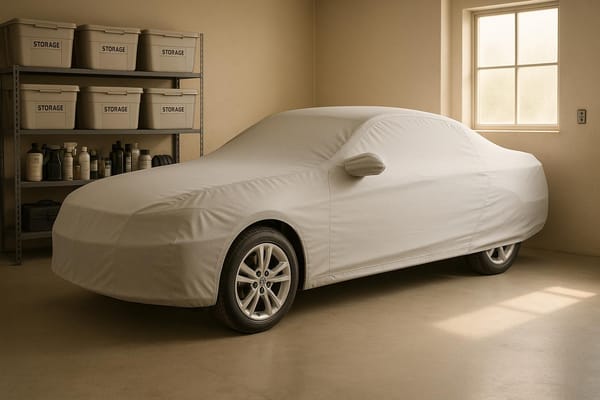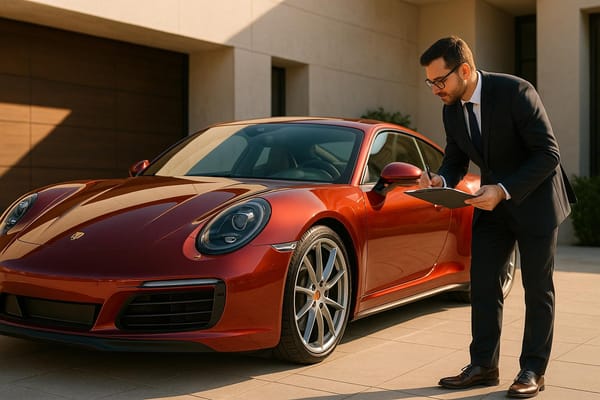Ferrari Classiche vs. Porsche Classic Certification
Explore the differences between Ferrari Classiche and Porsche Classic certification, and how they impact the authenticity and value of classic cars.
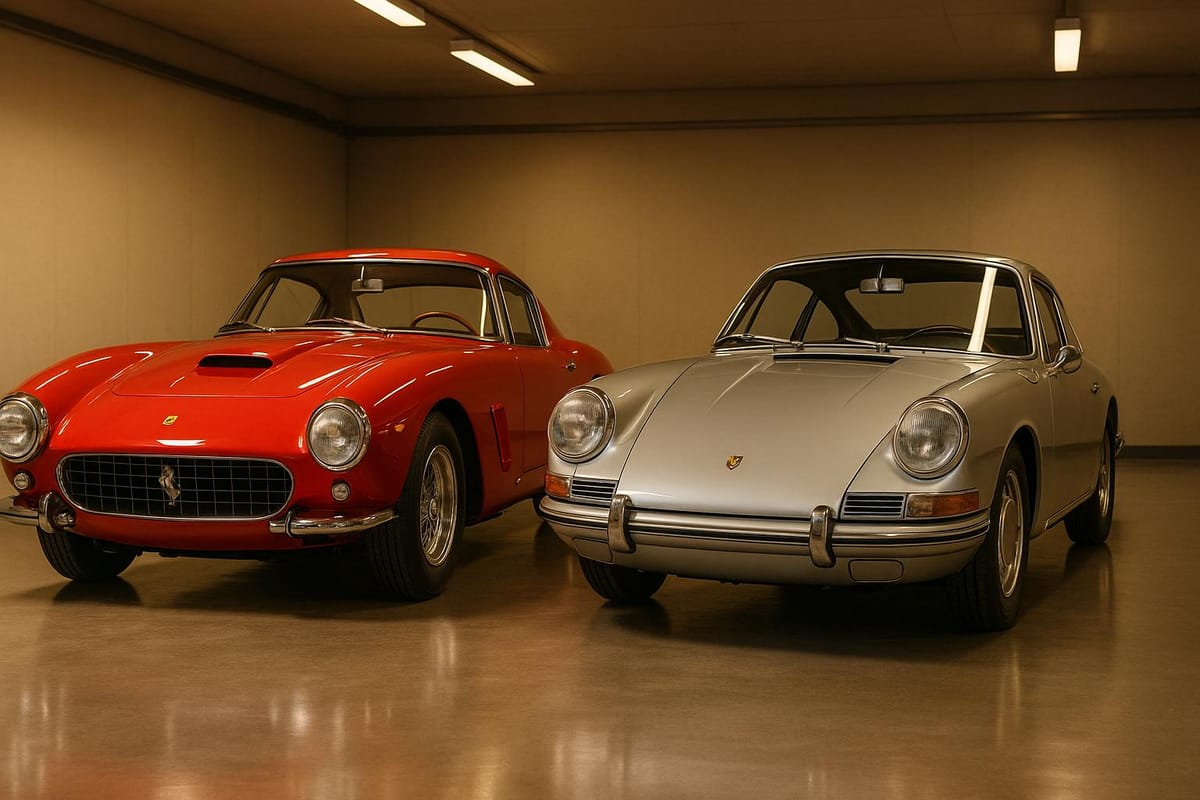
When it comes to verifying the authenticity of classic cars, Ferrari and Porsche offer two distinct certification programmes. Here’s a quick breakdown to help you decide:
- Ferrari Classiche: Best for preserving originality and maximising value for rare or historic Ferraris. Requires strict adherence to original components and includes a detailed process carried out in Maranello or authorised centres. Costs start from £4,400 and can go up to £9,200+ for full certification.
- Porsche Classic: A more accessible option for a wider range of Porsche models, with two levels of certification starting at £125. It’s carried out at authorised dealerships and allows some flexibility for modifications.
Quick Comparison
| Feature | Ferrari Classiche | Porsche Classic |
|---|---|---|
| Eligible Models | Road cars (20+ years old), Special Series, Sport, and F1 models | Models out of production for 10+ years (e.g., 356, 911 up to Type 996) |
| Base Cost | £4,400–£9,200+ | £125–£500+ |
| Inspection Location | Maranello or authorised centres | Porsche Classic Partners or authorised dealers |
| Validity Period | Recertification every 2 years | One-time certification |
| Documentation | Certificate of Authenticity (Red Book) | Technical Certificate with photos |
| Focus | Original chassis and components | Vehicle data and condition |
Both certifications enhance resale value by 15–16% on average, but Ferrari’s process is more detailed and costly, while Porsche’s is quicker and more flexible.
If you’re focused on preserving a Ferrari’s legacy or attending exclusive events, Ferrari Classiche is the way to go. For Porsche owners seeking a practical and cost-effective way to document their car’s history, Porsche Classic is a great choice.
Porsche, Ferrari, and Aston Martin: Investment or Enthusiast’s Dream?
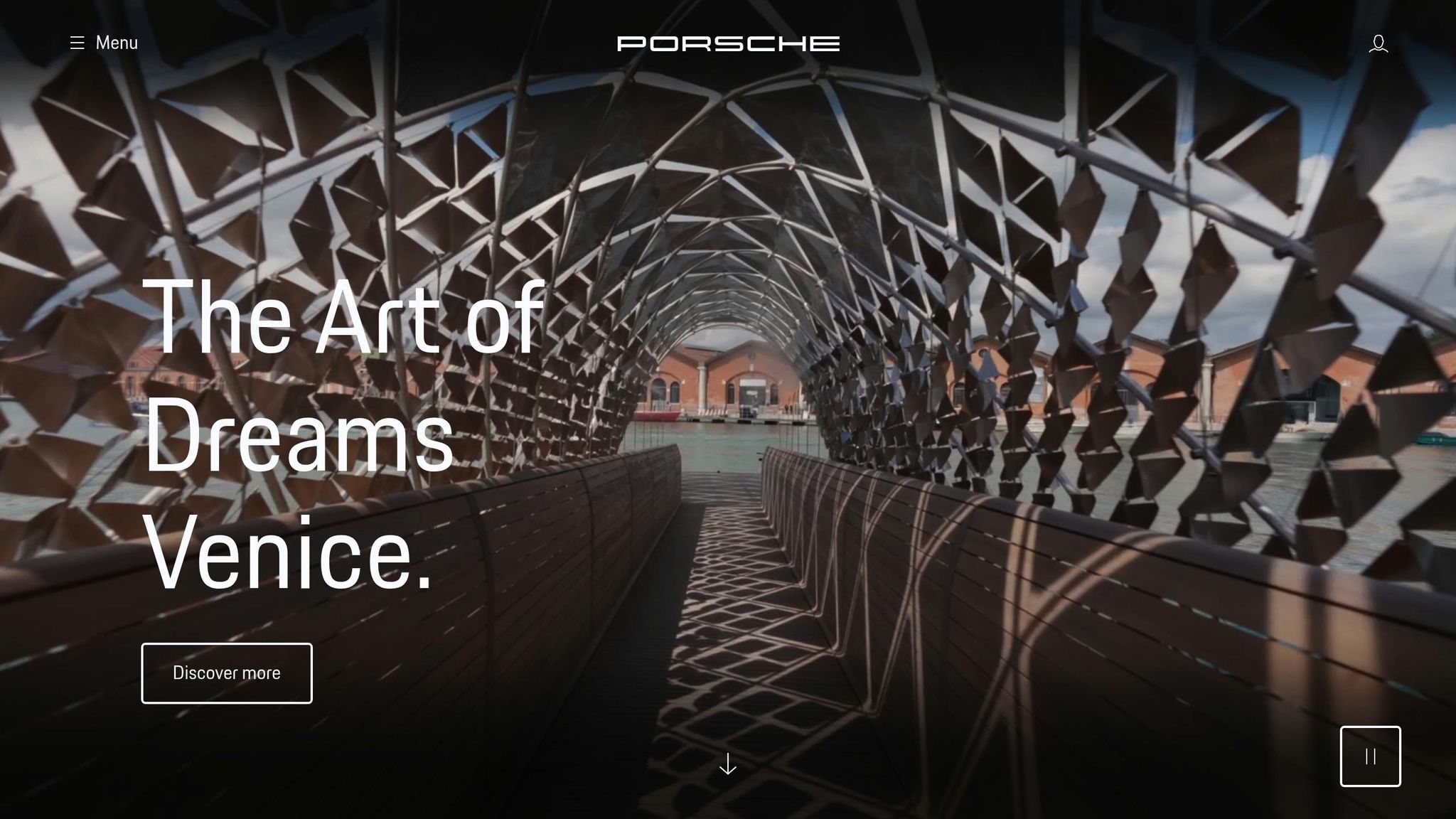
Ferrari Classiche: Process and Requirements
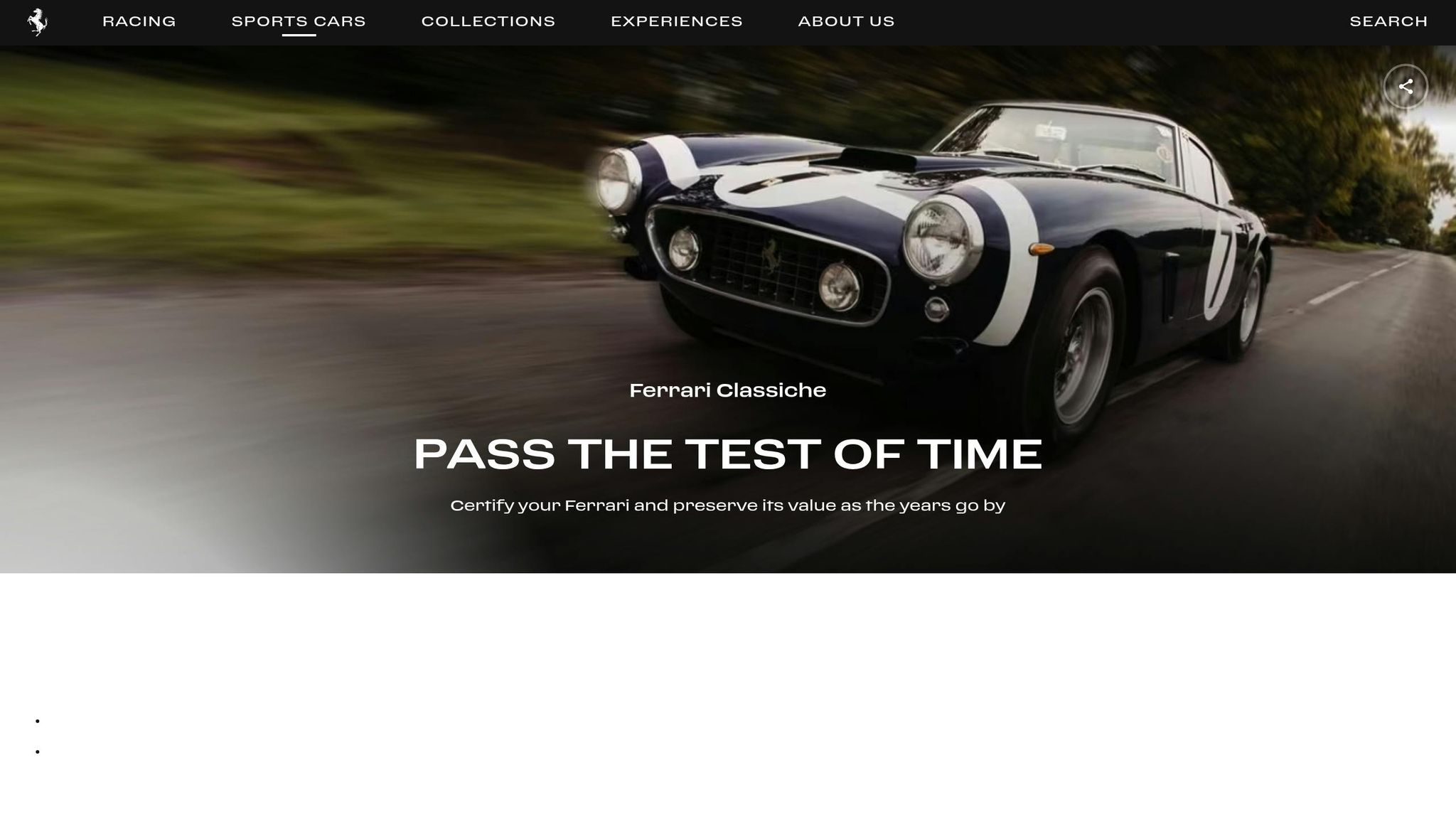
Since its launch in 2006, Ferrari's Classiche certification programme has set the gold standard for verifying the authenticity of classic Ferraris. The process ensures that each car aligns with the precise standards established at Maranello.
Which Cars Qualify
The Ferrari Classiche certification is open to three main categories of vehicles:
| Vehicle Category | Eligibility Criteria |
|---|---|
| Road Cars | Must be over 20 years old |
| Special Series | No age restrictions |
| Competition Cars | Includes F1 and Sport models |
To qualify, the car must be in full working condition and fitted with original or period-correct OEM parts. The chassis, in particular, must be original, as it forms the cornerstone of the authentication process.
Steps to Certification
The certification process is meticulous, carried out either at Ferrari's Maranello headquarters or through authorised dealers. Here's how it works:
-
Initial Assessment
Experts begin by photographing and measuring the vehicle. These details are compared against Ferrari's assembly records, which date back to 1947. -
Technical Analysis
A thorough inspection is conducted, covering:- Verification of the chassis to ensure it matches original specifications
- Examination of the bodywork and interior
- Detailed checks of mechanical and electrical systems
-
Certification Committee Review
The final report is reviewed by the Certification Committee. If any non-original parts are found, they must be replaced with genuine Ferrari components before certification can proceed.
These detailed inspections ensure the car's authenticity, offering peace of mind for both collectors and investors.
Fees and Documents
The cost of Ferrari Classiche certification depends on the level of verification required:
| Service Level | Price Range | Includes |
|---|---|---|
| Basic Documentation | Double-digit figures (£) | Laminated specification sheet |
| Deluxe Documentation | Triple-digit figures (£) | Comprehensive report with photographs |
| Full Certification | Several thousand pounds | Complete authentication process |
"The Certificate of Authenticity – available for road cars over 20 years old, Special Series, Sport and Ferrari F1 models – traces the history of the vehicle, verifying its conformity to the original design and the origin of each component." – Ferrari.com
To maintain certification, vehicles need regular inspections as outlined in the Ferrari Red Book. For cars requiring restoration, costs at the Ferrari Classiche department can exceed £1 million. However, this investment often translates into a significant boost in market value.
Porsche Classic: Process and Requirements
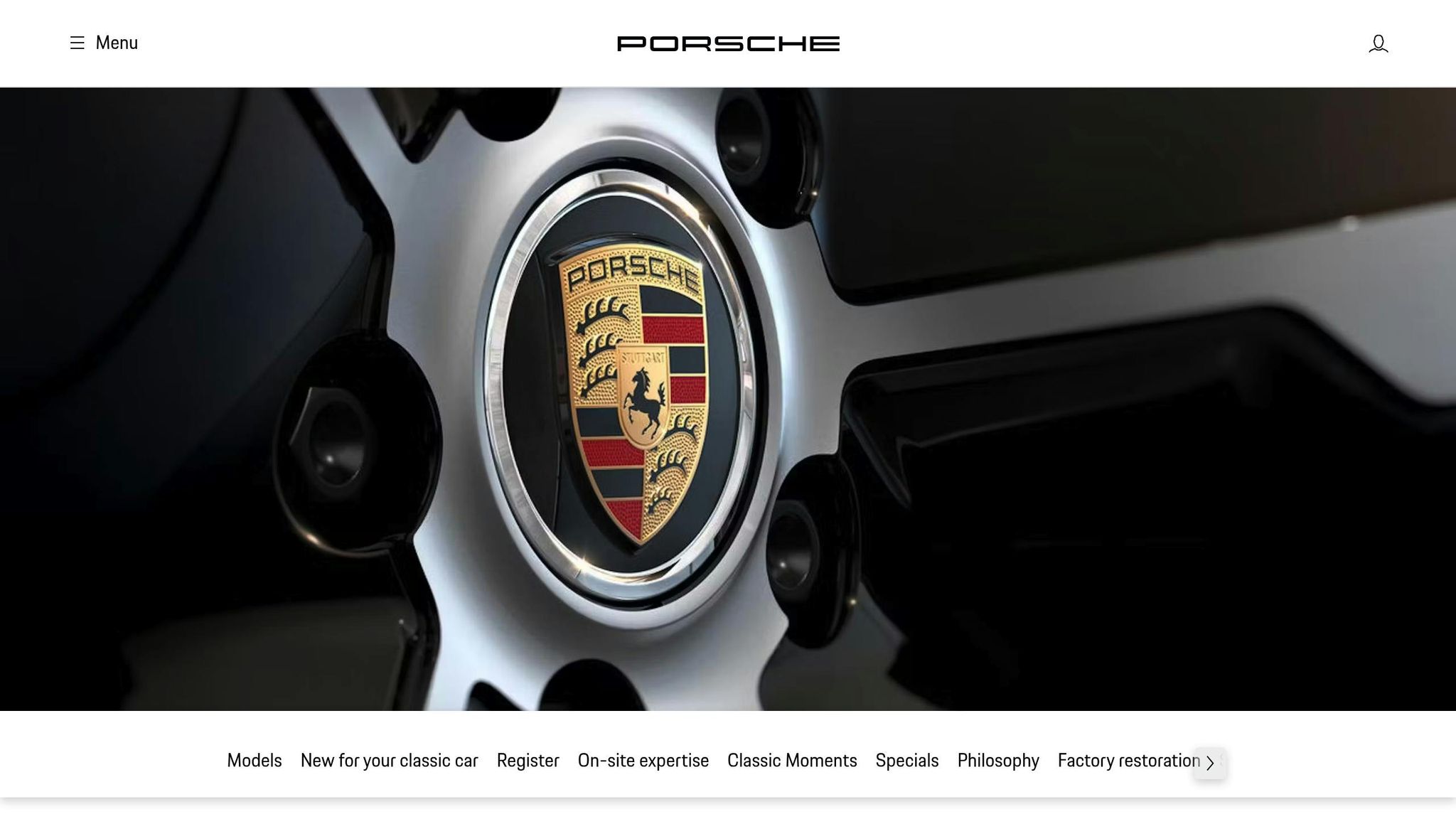
Porsche's Classic certification is a way to verify a vehicle's authenticity through its Technical Certificate programme, offering validation for a variety of historic models.
Cars That Qualify
To be eligible for certification, a Porsche vehicle must have been out of standard production for at least 10 years. Eligible models include:
| Model Series | Qualifying Variants |
|---|---|
| Early Classics | 356, 914, 959 |
| 911 Series | All variants up to Type 996 |
| Entry Models | Boxster (Type 986) |
| GT Models | Carrera GT |
| Four/Eight-Cylinder | 924, 928, 944, 968 |
| SUV | First-generation Cayenne |
Once eligibility is confirmed, the car undergoes a thorough three-step inspection process.
Inspection Steps
The certification process is carried out at Porsche Classic Partners or authorised dealerships and includes the following steps:
-
Initial Documentation Review
Factory records are checked to confirm production details, including the car's original colours, materials, and engine or transmission numbers. -
Technical Evaluation
A detailed assessment is performed, covering the exterior, interior, drive system, underbody, and suspension. -
Professional Documentation
High-quality images of the car's exterior and interior are taken by technicians trained by Porsche Classic, ensuring every detail is captured.
Costs and Paperwork
The cost of certification depends on the level of documentation chosen. Here’s a breakdown:
| Service Type | Cost | Includes |
|---|---|---|
| Classic Technical Certificate | £400* | Full inspection report, technical evaluation, professional photos |
| Production Specification | £100* | Basic vehicle documentation |
*Prices are approximate, converted from USD, and exclude VAT.
"This service gives you a feel of how safe and true the vehicle is compared to when the car initially is delivered from the factory." - Clyde Albright, Team Technician Lead, Porsche Grapevine
If any components fail the inspection, they must be repaired to meet certification standards using approved methods. Once complete, the final documentation is presented in a premium folder that outlines the car's condition and authenticity in detail.
Direct Comparison: Ferrari vs Porsche Certification
Programme Features
Ferrari and Porsche take distinct approaches to verifying the authenticity of their classic vehicles. Here's how their programmes compare:
| Feature | Ferrari Classiche | Porsche Classic |
|---|---|---|
| Eligible Models | Road cars over 20 years old, Special Series, Sport, and F1 models | Historical models from 356 to Carrera GT |
| Base Cost | £5,200 | £400 |
| Inspection Location | Maranello or authorised dealers | Porsche Classic Partners or authorised dealers |
| Validity Period | Recertification every 2 years | One-time certification |
| Documentation | Certificate of Authenticity (Red Book) | Technical Certificate with photos |
| Inspection Focus | Original chassis and components verification | Vehicle data and condition assessment |
| Authentication | Signed by Piero Ferrari | Endorsed by General Manager and Service Advisor |
The next section breaks down the unique benefits and challenges of each programme.
Benefits and Limitations
While both programmes aim to preserve and verify classic cars, they have distinct strengths and drawbacks. Ferrari Classiche is all about precision and factory-level authenticity, supported by their detailed historical records. As one enthusiast put it:
"If you don't have this [Red Book], you don't have the truth."
However, this level of detail comes at a cost. Factory restorations can exceed £860,000 and take up to fourteen months to complete. Additionally, the biennial recertification adds ongoing expenses for owners.
Porsche, on the other hand, offers a more accessible certification process with tiered documentation. Their Technical Certificate allows for documented modifications, ensuring that vehicles retain historical value without strict adherence to originality.
Market trends show that certified vehicles from both brands enjoy a 15-16% higher value compared to uncertified examples. Here’s a closer look at what each programme brings to the table:
Ferrari Classiche Advantages:
- Factory-backed authentication
- Exclusive access to Ferrari events
- Detailed historical records
- Higher resale premiums, especially for rare models
Porsche Classic Advantages:
- Lower cost of entry
- Flexibility for modifications
- Broad network of authorised dealers
- One-time certification without recurring fees
As one expert noted:
"A Ferrari 250 LM that might have started life as a bit of chassis, that has now been through a factory restoration. That will be worth a lot more money than it would have been just as a 'car' with a big story attached."
Ultimately, the decision between Ferrari and Porsche certification depends on the vehicle, the owner's goals, and the intended use. Ferrari Classiche is ideal for those focused on preserving authenticity and maximising value, while Porsche Classic offers a practical and flexible option for enthusiasts. These certification choices not only influence resale value but also shape the broader market for classic cars.
Market Effects and Future Changes
After delving into the rigorous certification processes, it's equally important to consider how these efforts impact the market and what changes might lie ahead.
Sales and Auction Results
Certified cars are consistently fetching higher prices at auctions, showcasing the market's growing appreciation for authenticity. For instance, in November 2021, a Ferrari Classiche-certified 1967 Ferrari 275 GTB achieved a staggering €2,142,500 at RM Sotheby's Guikas Collection Sale. Similarly, a Porsche Classic-certified 1987 Porsche 959 Komfort sold for £1,158,125 at RM Sotheby's London sale.
Francesco Stevanin, a director in the industry, highlights the financial advantage of certification:
"The added value percentage, between a certified and an uncertified car, is between 15 and 16 percent, in the general market".
However, Simon Kidston, a British car collector and dealer, offers a more cautious view on the process:
"If you want perfection, just dropping your car at the manufacturer and saying, 'Call me when it's ready and tell me how much I owe you,' is definitely not the right approach. You'll be waiting for a long time, you'll be severely out of pocket, and your car will be picked apart the first time it gets scrutinised by judges who actually know what they're looking at."
Interestingly, despite the high demand, Ferrari Classiche has restored fewer than 150 cars since its founding in 2006. This exclusivity, paired with strong auction results, underscores the premium buyers are willing to pay for verified authenticity. It also pushes manufacturers to refine their certification processes further.
New Verification Methods
As the market evolves, manufacturers like Porsche are stepping up their game by incorporating digital tools into their certification processes. These advancements aim to streamline verification while maintaining high standards.
Here’s a closer look at some of Porsche's key innovations:
| Innovation | Current Implementation | Future Impact |
|---|---|---|
| Digital Documentation | Enhanced PCM systems with expanded functionality | Faster, more efficient verification |
| AI Integration | Predictive maintenance and personalised settings | Improved accuracy in component checks |
| Sustainability Focus | Use of bio-based materials and renewable energy | Better preservation and eco-friendly methods |
Michael Mauer, Vice President Style Porsche, underscores the importance of standardisation in these efforts:
"In the same way that the Porsche 911 is the archetype of all sports cars, for more than 60 years the US company's color standard system has been the reference work for everyone that uses colors in design."
These enhancements come at a cost, as in-house restoration projects remain a significant investment. Lamborghini's restorations typically range from £225,000 to £270,000 plus tax, while Aston Martin's services can climb to around £425,000 plus tax.
Looking ahead, the certification process seems to be shifting towards a hybrid model. This approach blends traditional craftsmanship with advanced digital tools, aiming to tackle challenges like lengthy restoration timelines. This evolution not only reflects the market's demand for authenticity but also its readiness to embrace modern solutions.
Conclusion: Which Certification to Choose
Choosing between Ferrari Classiche and Porsche Classic certification comes down to balancing the details of the process with the potential market impact.
If you're a Ferrari owner with a vehicle over 20 years old - whether it’s a Special Series, Sport, or F1 model - Ferrari Classiche offers a certification process rooted in authenticity, completed exclusively in Maranello, Italy. On the other hand, Porsche Classic certification is more accessible, available through any authorised dealer. The costs also differ significantly: Porsche Classic starts at £410 plus VAT for a Technical Certificate, while Ferrari Classiche ranges from around £4,400 for a stock 360 Spider to approximately £9,200 for a 2005 Superamerica.
Here’s a side-by-side comparison to help with your decision:
| Consideration | Ferrari Classiche | Porsche Classic |
|---|---|---|
| Initial Cost | £4,400–£9,200+ | From £410 |
| Location | Maranello only | Any authorised dealer |
| Value Impact | 15–16% increase in value | Market premium |
| Processing Time | Longer waiting period | Generally faster |
| Parts Requirements | Strict adherence to original components | Focus on original specifications |
This comparison highlights the key differences. Ferrari Classiche, while more expensive, can significantly enhance a car’s value and authenticity, making it an appealing investment for collectors. Meanwhile, Porsche Classic provides a more affordable and convenient option for owners looking to authenticate their vehicles without extensive restoration demands.
For those seeking certified classics without navigating the certification process themselves, platforms like MARQHAUS offer a curated selection of vehicles that have already undergone these rigorous programmes. This allows buyers to enjoy the benefits of manufacturer verification with minimal hassle.
FAQs
What are the key differences in eligibility requirements between Ferrari Classiche and Porsche Classic certification programmes?
Ferrari Classiche certification is available for Ferraris that are over 20 years old or belong to limited series production. To qualify, the car must be in full working order, feature its original OEM parts, and successfully pass a meticulous inspection carried out by Ferrari experts.
Porsche Classic certification caters to Porsche models that have been out of standard production for at least a decade. This process involves an in-depth technical inspection to evaluate the car’s condition and confirm it aligns with its original specifications.
Both certifications are designed to honour the legacy of these legendary brands, providing enthusiasts and collectors with a way to uphold their cars' originality and historical value.
How does certification affect the resale value of classic Ferraris and Porsches?
Certification through Ferrari Classiche or Porsche Classic can play a big role in boosting the resale value of these legendary cars. Take Ferraris, for instance - certified models often fetch much higher prices than uncertified ones. Why? Because buyers place immense value on the guarantee of authenticity and originality. The same goes for Porsche Classic certification, which enhances a car's appeal by verifying its history and quality.
Although the certification process can come with a notable upfront cost, many collectors see it as a smart investment. The added resale value and the confidence it provides to potential buyers often more than make up for the initial expense. For those aiming to protect and maximise the worth of their classic car, certification is a clear win.
What are the pros and cons of Ferrari Classiche's recertification compared to Porsche Classic's one-time certification?
Ferrari Classiche's recertification programme brings some clear perks. It helps maintain the car's originality and ensures it stays in excellent condition through regular inspections. For collectors focused on preserving historical accuracy and boosting long-term value, this programme can be a solid choice.
That said, the requirement for periodic recertification might feel like a downside for some, given the added costs and effort it demands. On the other hand, Porsche Classic offers a one-time certification process. This simpler approach guarantees authenticity upfront without the hassle of repeated renewals, making it a practical and budget-friendly option for those who prefer less complexity.

